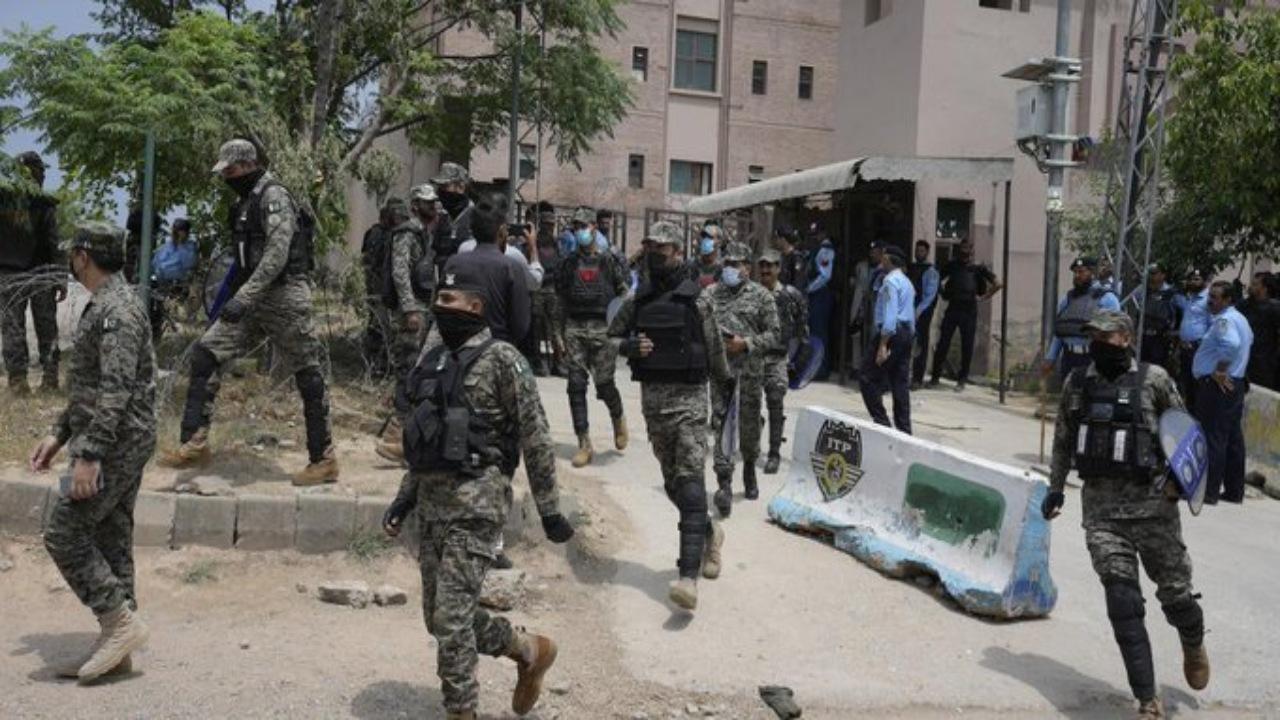Human Rights Watch on Wednesday said that the Pakistan government should immediately transfer civilians set to be tried in military courts to the civilian justice system. Trying civilians before military courts violates Pakistan’s obligations under international human rights law to ensure the due process and fair trial rights of criminal suspects

Paramilitary troops and police officers stand guard outside a court in Islamabad, Pakistan. File Photo/AP
Human Rights Watch on Wednesday said that the Pakistan government should immediately transfer civilians set to be tried in military courts to the civilian justice system. Trying civilians before military courts violates Pakistan’s obligations under international human rights law to ensure the due process and fair trial rights of criminal suspects, the top global rights body said.
ADVERTISEMENT
The Pakistan police have handed 33 civilian suspects over to the army for trial in military courts. The suspects are charged with attacking sensitive defense installations, and damaging or stealing important government equipment, computers, and other sources of data collection. “The Pakistan Army Act (PAA), 1952, and Official Secrets Act, 1923 allow trying civilians in military courts only in narrowly defined circumstances, including for inciting mutiny, spying, and taking photographs of “prohibited” places,” HRW said in a statement issued from New York.
“The Pakistani government has a responsibility to prosecute those committing violence, but only in independent and impartial civilian courts,” said Patricia Gossman, associate Asia director at Human Rights Watch. “Pakistan’s military courts, which use secret procedures that deny due process rights, should not be used to prosecute civilians, even for crimes against the military.”
Violence swept across Pakistan on May 9, 2023 after the police arrested former Prime Minister Imran Khan on allegedly “trumped up” corruption charges. Many of Khan’s supporters allegedly attacked police officers and set fire to ambulances, police vehicles, and schools. Among the places attacked were the military headquarters and other offices in Rawalpindi and the houses of senior military officials.
Following the clashes, the police arrested thousands of members of Khan’s political party, Tehreek-i-Insaaf, on charges of criminal intimidation, rioting, and assault on government officials.
Many have been charged under vague and overbroad laws prohibiting rioting and creating threats to public order. All those arrested merely for their political affiliation should be released immediately and any charges dropped.
Also read: 'Undeclared martial law' in Pakistan, says Imran Khan; files plea in Supreme Court
The government said that those arrested and charged with acts of violence will face trials in civilian courts, except for those who broke into and entered restricted access military installations, who will be tried in military courts. According to the government, these defendants will have the right of appeal to the civilian high courts and Supreme Court.
“Article 14 of the International Covenant on Civil and Political Rights (ICCPR) guarantees everyone the right to a trial by a competent, independent, and impartial tribunal. The Human Rights Committee, the international expert body authorized to monitor compliance with the ICCPR, has stated that the “trial of civilians in military or special courts may raise serious problems as far as the equitable, impartial and independent administration of justice is concerned,” and that “trials of civilians by military or special courts should be exceptional, i.e. limited to cases where the State party can show that resorting to such trials is necessary and justified by objective and serious reasons, and where … regular civilian courts are unable to undertake the trials,” HRW said.
International human rights standards provide no basis for Pakistani authorities to try these cases in military courts, especially as the civilian courts are functioning, the rights body said. “Pakistan’s military court judges are serving officials and are not independent from the government. In the past, no independent monitoring of military trials in Pakistan has been allowed. Defendants have often been denied copies of judgments with the evidence and reasoning in the verdicts in their cases.”
“Denying people a fair trial is not the answer to Pakistan’s complex security and political challenges,” Gossman said. “Strengthening the civilian courts and upholding the rule of law is the message the Pakistani government should send as an effective and powerful response to violence.”
 Subscribe today by clicking the link and stay updated with the latest news!" Click here!
Subscribe today by clicking the link and stay updated with the latest news!" Click here!







